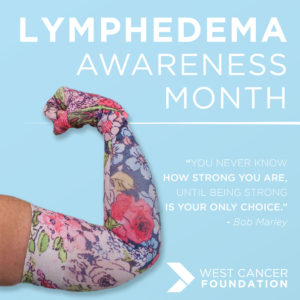Lymphedema is not commonly discussed and can be a side effect of a cancer diagnosis or cancer treatment. March is Lymphedema Awareness Month, and we want to take the opportunity to share a little about lymphedema itself as well as provide some information on our Lymphedema Assistance Program.
If you have lymphedema due to cancer or cancer treatments and need help purchasing garments please visit our Lymphedema Assistance Program page for more information.
Keep reading below to learn more about what lymphedema is, along with the causes, signs, and treatment options available.
What is lymphedema?
The lymph system is made up of lymph vessels, tissues, and organs that carry lymph, the fluid that helps to make up the lymph system, throughout the body. When lymph is not able to flow through the body like it should, lymphedema occurs. Lymphedema is the build-up of lymph fluid in body tissues just under your skin when the lymph system is damaged or blocked.
What causes lymphedema?
Many times Lymphedema is caused when something does not allow proper drainage of the lymph system. Improper drainage can be caused by the blockage of a lymph vessel or deterioration of the lymph system.
One of the most common causes of lymphedema is cancer. Cancer cells can block lymph vessels and/or the lymph system can be damaged by cancer cells or cancer treatments. Cancer surgery and inherited conditions are also among the causes of lymphedema.
When the lymph fluids build up in body tissues due to lack of drainage, it can cause swelling and discomfort, usually in the arm or leg. Lymphedema can also occur in other parts of the body such as the breasts, head, neck, or genitals.
What are the signs of Lymphedema?
There are multiple signs to look for in regard to lymphedema. It is important that you call your physician if you experience any signs of lymphedema near the area affected by surgery or cancer.
Signs include:
- Swelling in part or all of the leg or arm
- Feeling of fullness or heaviness
- Skin feeling tight
- Restricted range of motion
- Hand, wrist, foot, or ankle becomes less flexible
- Clothes feel tighter in a certain area
- Jewelry or shoes feel tighter
- Hardening or thickening of the skin
- Recurring infections
Treatment for lymphedema
While there is no cure for lymphedema, there are methods of treatments aimed at helping reduce the swelling and preventing complications caused by lymphedema.
Therapy massages, compression garments, and exercise are some of the treatment options available to help lymph flow and ease discomfort caused by lymphedema.
Therapy massages
Therapists trained in these types of massages can help move the fluid to an area with working lymph vessels by using light pressure. People should avoid manual lymph drainage if they have a skin infection, blood clots, or active cancer in the affected limb.
Compression Garments
Compression garments such as close-fitting elastic sleeves or stockings can work to compress the arm or leg and encourage lymph fluid drainage. These garments often require a prescription to ensure the proper amount of compression is used. You may also need to be measured by a professional to ensure proper fit.
Exercise
Exercise can help lymph move through the lymphatic system, which may help reduce swelling. For example, gentle contraction of the muscles in the affected area can help move the excess fluid out of the swollen arm or leg. It is recommended to start with slow and gentle exercises, such as walking and deep breathing, and then gradually increase activity. Please note, it is important to talk about your exercise plans with your healthcare provider before starting any new activity.
West Cancer Foundation Lymphedema Assistance Program
Lymphedema can be incredibly painful and debilitating for patients, and the garments and
therapy to reduce swelling and prevent other complications can be expensive with or without health insurance.
We are proud to be one of the only organizations in the country to offer patient assistance through our Lymphedema Assistance Program, which helps provide patients with medical compression garments to help alleviate the painful symptoms experienced with lymphedema.
We believe everybody should be able to receive the healthcare they need. Through generous donations and grants, we are able to partner with suppliers and help make a difference for those who need it most.
If you or a loved one has been diagnosed with lymphedema and need to purchase pain-relieving garments, please contact us today to apply for assistance. You can find more information about our Lymphedema Assistance Program linked here.
Sources:
https://www.cancer.gov/about-cancer/treatment/side-effects/lymphedema/lymphedema-pdq
https://www.mayoclinic.org/diseases-conditions/lymphedema/symptoms-causes/syc-20374682
https://www.mayoclinic.org/diseases-conditions/lymphedema/diagnosis-treatment/drc-20374687
















